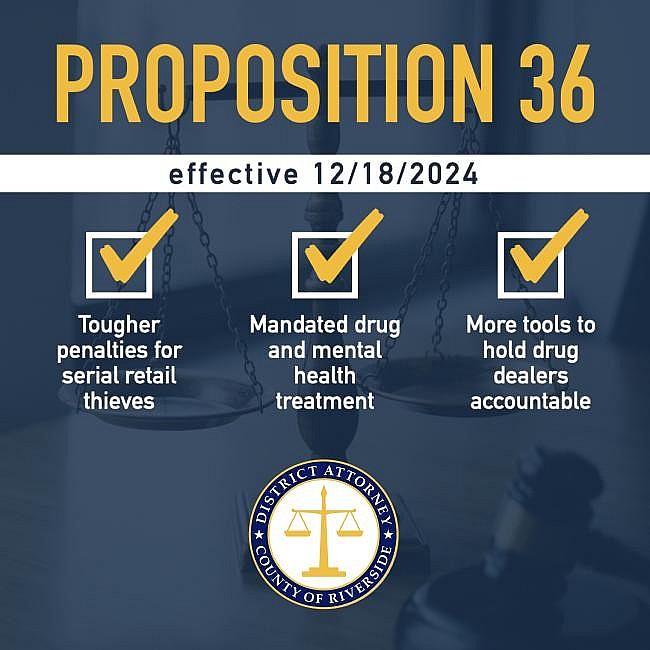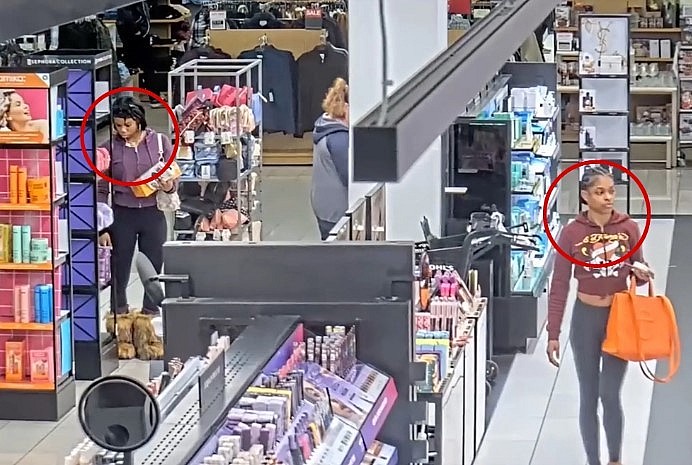What is Proposition 36? Understanding California’s New Laws on Theft and Drug Offenses
 |
| Proposition 36 |
In recent months, Californians have witnessed a significant shift in the state’s approach to theft and drug-related crimes with the implementation of Proposition 36 (Prop. 36), formally known as the Homelessness, Drug Addiction, and Theft Reduction Act. Effective December 18, 2024, this groundbreaking legislation is reshaping how certain crimes are prosecuted and penalized, sparking both support and debate across the state.
The Context Behind Proposition 36
California has long grappled with rising incidents of retail theft and drug-related offenses, exacerbating concerns among businesses, law enforcement, and communities. Prop. 36 emerged in response to public demand for stricter laws targeting repeat offenders, organized retail crime, and the opioid crisis. By reclassifying certain offenses and introducing nuanced sentencing mechanisms, Prop. 36 represents a departure from leniency for low-level crimes and seeks to balance public safety with rehabilitation efforts.
A Shift to “Wobbler” Offenses
 |
| Stealing is a felony in California |
At the heart of Prop. 36 is the introduction of "wobbler" offenses, which allow certain crimes to be charged as either felonies or misdemeanors, depending on the circumstances. This flexibility aims to address the severity of repeat offenses while maintaining proportionality for first-time offenders.
Two notable wobbler offenses under the new law include:
- Drug Possession with Prior Convictions: Individuals caught possessing hard drugs (e.g., fentanyl, heroin, cocaine, methamphetamine) with two prior drug-related convictions may face felony charges under Health and Safety Code section 11395.
- Petty Theft with Prior Convictions: Repeat offenders with two prior theft-related convictions can now be charged with felonies for petty theft or shoplifting, under Penal Code section 666.1.
These changes address longstanding criticisms of California’s leniency on repeat offenders, particularly in the face of increasing retail theft and drug crimes.
Strengthened Penalties for Drug Offenses
Prop. 36 also includes provisions aimed at combating the opioid crisis and curbing drug trafficking. Key measures include:
- Enhanced Penalties for Fentanyl Trafficking: Large-scale fentanyl operations now face harsher sentences, reflecting the urgent need to tackle this deadly epidemic.
- Firearm Involvement in Drug Crimes: Stricter penalties are imposed on drug dealers caught with firearms, emphasizing the connection between drug trade and violence.
- “Watson-Style” Advisements: Courts must now warn convicted drug dealers that they could face murder charges if their trafficking activities result in a fatal overdose. Modeled after warnings used in DUI cases, this advisement aims to deter reckless and deadly behaviors.
Tougher Stance on Property Crimes
To address organized retail theft and large-scale property crimes, Prop. 36 introduces several changes:
- Aggregation of Theft Values: Under the new law, stolen property from multiple thefts can be combined to meet the felony threshold. For instance, thefts from different stores can now be aggregated to classify the crime as a felony if the total value exceeds $950.
- Increased Penalties for Large-Scale Losses: Crimes resulting in losses exceeding $50,000 now carry more severe penalties, signaling a crackdown on high-value theft operations.
- Targeting Organized Criminal Activity: Prop. 36 raises penalties for crimes involving multiple perpetrators, addressing the rise in organized retail crime rings.
These measures are designed to deter professional thieves and organized groups that exploit previous loopholes in theft laws.
Balancing Punishment and Rehabilitation
While Prop. 36 takes a tougher stance on repeat offenders, it also emphasizes treatment and rehabilitation, particularly for drug-related crimes. A significant provision allows offenders charged with drug felonies to opt for treatment programs in lieu of jail or prison time. Successful completion of these programs can result in the dismissal of their charges, reinforcing the view that addiction is a public health issue requiring intervention rather than solely punitive measures.
Additionally, judicial reviews for wobbler offenses ensure that each case is assessed individually, balancing public safety concerns with the offender’s circumstances and risk level.
Real-Life Impacts: Prop. 36 in Action
The implementation of Prop. 36 has already sparked attention and debate. In a widely publicized case, three women in Seal Beach, California, were caught shoplifting over $600 worth of merchandise from an Ulta Beauty store. The suspects, arrested and charged under the new law, were stunned to learn that their actions could lead to felony charges—a stark departure from previous policies that often resulted in citation and release for similar crimes.
Videos of the incident, released by the Seal Beach Police Department, highlight the law’s immediate impact on organized retail theft and its deterrent effect. The department lauded the new legislation, stating that it strengthens their commitment to combating crime while ensuring accountability for offenders.
Public and Political Reactions
Prop. 36 has received overwhelming support from voters, with nearly 70% approving the measure. Advocates argue that the new law addresses critical gaps in California’s approach to crime, particularly by targeting repeat offenders and organized crime. Business owners, in particular, have expressed relief, noting that stricter penalties could help curb the wave of retail theft that has plagued the state in recent years.
However, critics caution against over-reliance on punitive measures. Some legal experts and advocacy groups worry that the law’s emphasis on stricter penalties may disproportionately impact marginalized communities, particularly individuals struggling with addiction or economic hardship. They argue that more resources should be allocated toward prevention, mental health services, and social support.
Navigating the New Legal Landscape
The changes brought by Prop. 36 require careful navigation by Californians. For individuals with prior convictions, understanding the implications of the new wobbler offenses is crucial. Similarly, businesses must stay informed about how the law can be leveraged to protect against theft and organized crime.
Law enforcement agencies, courts, and community organizations are also adapting to the updated legal framework, ensuring that the balance between justice and rehabilitation is upheld.
Conclusion
Proposition 36 marks a pivotal moment in California’s fight against drug addiction, retail theft, and organized crime. By introducing flexible sentencing for wobbler offenses, enhancing penalties for large-scale operations, and emphasizing treatment over punishment, the law seeks to address complex societal challenges in a comprehensive manner. While debates continue over its long-term impact, Prop. 36 undeniably reflects the state’s commitment to safeguarding communities while offering pathways for rehabilitation.
 Top 10+ Most Prestigious Schools for Forensics and Crime Solving Careers in US Today Top 10+ Most Prestigious Schools for Forensics and Crime Solving Careers in US Today Today, forensic medicine serves legal issues and develops rapidly. Students can study this field more. We'll examine the nation's top forensic science programs here. |
 Top 10 Safest States In The US Based on the Violent Crime Rate Today Top 10 Safest States In The US Based on the Violent Crime Rate Today Which factor affects the title 'the safest states' in the US? Read on our article below to know which states are in top 10. |
 Top 10+ Colleges in the US with the Worst Crime Rates Top 10+ Colleges in the US with the Worst Crime Rates Students attending these schools are far more likely to experience property crime during their enrollment than violent crime. Check out the list of the ten ... |
 What is Rupnow's Manifesto and the Motive for Shooting at Christian School What is Rupnow's Manifesto and the Motive for Shooting at Christian School Police searched the home of 15-year-old Natalie 'Samantha' Rupnow for a manifesto (as friends claimed on social media) and to determine the reason or the ... |























